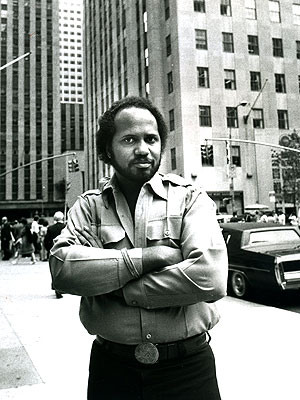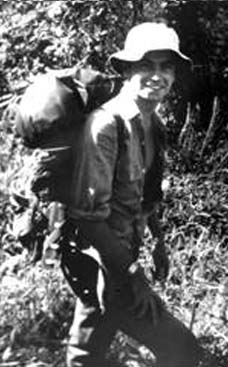2007.12.18: December 18, 2007: Headlines: COS - Peru: Obituaries: Film: African American Issues: New York Times: Obituary for Peru RPCV St. Clair Bourne, a documentary filmmaker who recorded American black culture
Peace Corps Online:
Directory:
Peru:
Peace Corps Peru:
Peace Corps Peru: Newest Stories:
2007.12.18: December 18, 2007: Headlines: COS - Peru: Obituaries: Film: African American Issues: New York Times: Obituary for Peru RPCV St. Clair Bourne, a documentary filmmaker who recorded American black culture
Obituary for Peru RPCV St. Clair Bourne, a documentary filmmaker who recorded American black culture

In the early 1960s, Mr. Bourne joined the Peace Corps and went to Peru, where he started a newspaper in a poverty-ridden settlement outside of Lima. He graduated from Syracuse in 1967 with a bachelor’s degree in journalism and political science. He then began studying filmmaking at Columbia University. But in 1968, he was arrested and expelled after joining in the takeover of a university building to protest the Vietnam War.
Obituary for Peru RPCV St. Clair Bourne, a documentary filmmaker who recorded American black culture
St.Clair Bourne, Filmmaker, Dies at 64
By DENNIS HEVESI
Published: December 18, 2007
St.Clair Bourne, a documentary filmmaker who recorded American black culture, produced portraits of eminent African-Americans and, in one stark film, drew a parallel between the civil rights movement and the “troubles” in Northern Ireland, died on Saturday in Manhattan. He was 64 and lived in Brooklyn.
The cause was a pulmonary embolism, said Judith Bourne, his sister and only immediate family member.
In a 36-year career in which he made more than 40 films, either producing or directing or doing both, Mr. Bourne’s works were seen on public television, commercial networks and at film festivals around the country. Among his subjects were the singer, actor and activist Paul Robeson; the poet, novelist and playwright Langston Hughes; the photojournalist and filmmaker Gordon Parks; and the poet and activist Amiri Baraka.
In 1989, Mr. Bourne produced and directed “Making ‘Do the Right Thing,’” a theatrical release about the Spike Lee film shot in Bedford-Stuyvesant, Brooklyn. In his review in The New York Times, the film critic Vincent Canby wrote, “It says something about the effectiveness of Mr. Bourne’s documentary that watching a murder scene as it is being shot is almost as harrowing as watching the scene in the finished film.”
“Paul Robeson: Here I Stand,” Mr. Bourne’s two-part series in 1999 for “American Masters” on PBS, showed that despite the public perception of its subject as a victimized, worn figure, he was clear and steadfast in his old age, asserting that progress toward racial equality was worth everything he had faced.
It was a conviction shared by Mr. Bourne. Ayuko Babu, director of the Pan African Film & Arts Festival, held annually in Los Angeles and Atlanta, said yesterday that Mr. Bourne had been shaped by the civil rights movement. “Because the African slave trade spread all over the planet,” Mr. Babu said, “for us to understand ourselves, we had to have an artist like St.Clair look at all our tragedy, all our beauty, and show that back to ourselves. By doing that, he gave other cultures a way of better understanding us.”
Mr. Bourne’s sister said Mr. Bourne had been particularly proud of his 1996 documentary, “John Henrik Clarke: A Great and Mighty Walk,” about the son of an Alabama sharecropper, born in 1915, who became an author, poet, historian, professor and a leader of the Pan-Africanist movement.
In 1983, Mr. Bourne produced and directed “The Black and the Green,” in which a group of American civil rights activists traveled to Northern Ireland and found that many Catholics there had been influenced by the civil rights movement. As The Washington Post reported then, “In the Belfast ghetto, the delegation members are strangers in a familiar land of crushed tenements, graffiti-stained walls and heavily armed law officers.”
The movie, Mr. Bourne told The Post, “ends up seeming pro-Irish Republican Army in the same sense that a film about Selma in the ’60s might have ended up seeming pro-black, but then I’m a filmmaker from the ’60s. I try to be humanistically political.”
Born in Harlem on Feb. 16, 1943, Mr. Bourne was the son of St.Clair T. and Gwendolyn Samuel Bourne. When he was 2, the family moved to Brooklyn. His father was a reporter and editor with The Amsterdam News and his mother was a nurse and medical social worker.
In the early 1960s, Mr. Bourne joined the Peace Corps and went to Peru, where he started a newspaper in a poverty-ridden settlement outside of Lima. He graduated from Syracuse in 1967 with a bachelor’s degree in journalism and political science. He then began studying filmmaking at Columbia University. But in 1968, he was arrested and expelled after joining in the takeover of a university building to protest the Vietnam War.
Still, a professor recommended him for a job as an assistant producer on “Black Journal,” the first black public affairs series on PBS. In 1971, Mr. Bourne started his own production company, now called Chamba Mediaworks.
Mr. Bourne’s marriages, to Sylvia Azure Walton and to Linda Miller, ended in divorce.
In an interview last year with Black Camera, a journal published by the Black Film Center/Archive at Indiana University, Mr. Bourne said he had tried to combine activism with journalism.
“Most of mainstream and public television in the late ’60s, and even during the ’70s,” he said, “was from the point of view of an outsider looking at a subculture — white people looking at black people. We said we identify with and are a part of the subjects we are filming.”
Links to Related Topics (Tags):
Headlines: December, 2007; Peace Corps Peru; Directory of Peru RPCVs; Messages and Announcements for Peru RPCVs; Obituaries; Film; African American Issues
When this story was posted in December 2007, this was on the front page of PCOL:





Peace Corps Online The Independent News Forum serving Returned Peace Corps Volunteers 
 | Dodd vows to filibuster Surveillance Act
Senator Chris Dodd vowed to filibuster the Foreign Intelligence Surveillance Act that would grant retroactive immunity to telecommunications companies that helped this administration violate the civil liberties of Americans. "It is time to say: No more. No more trampling on our Constitution. No more excusing those who violate the rule of law. These are fundamental, basic, eternal principles. They have been around, some of them, for as long as the Magna Carta. They are enduring. What they are not is temporary. And what we do not do in a time where our country is at risk is abandon them." |
 | What is the greatest threat facing us now?
"People will say it's terrorism. But are there any terrorists in the world who can change the American way of life or our political system? No. Can they knock down a building? Yes. Can they kill somebody? Yes. But can they change us? No. Only we can change ourselves. So what is the great threat we are facing? I would approach this differently, in almost Marshall-like terms. What are the great opportunities out there - ones that we can take advantage of?" Read more. |
 | Senator Dodd's Peace Corps Hearings
Read PCOL's executive summary of Senator Chris Dodd's hearings on July 25 on the Peace Corps Volunteer Empowerment Act and why Peace Corps Director Ron Tschetter does not believe the bill would contribute to an improved Peace Corps while four other RPCV witnesses do. Highlights of the hearings included Dodd's questioning of Tschetter on political meetings at Peace Corps Headquarters and the Inspector General's testimony on the re-opening of the Walter Poirier III investigation. |
 | Paul Theroux: Peace Corps Writer
Paul Theroux began by writing about the life he knew in Africa as a Peace Corps Volunteer. His first first three novels are set in Africa and two of his later novels recast his Peace Corps tour as fiction. Read about how Theroux involved himself with rebel politicians, was expelled from Malawi, and how the Peace Corps tried to ruin him financially in John Coyne's analysis and appreciation of one of the greatest American writers of his generation (who also happens to be an RPCV). |
 | Ambassador revokes clearance for PC Director
A post made on PCOL from volunteers in Tanzania alleges that Ambassador Retzer has acted improperly in revoking the country clearance of Country Director Christine Djondo. A statement from Peace Corps' Press Office says that the Peace Corps strongly disagrees with the ambassador’s decision. On June 8 the White House announced that Retzer is being replaced as Ambassador. Latest: Senator Dodd has placed a hold on Mark Green's nomination to be Ambassador to Tanzania. |
 | Suspect confesses in murder of PCV
Search parties in the Philippines discovered the body of Peace Corps Volunteer Julia Campbell near Barangay Batad, Banaue town on April 17. Director Tschetter expressed his sorrow at learning the news. “Julia was a proud member of the Peace Corps family, and she contributed greatly to the lives of Filipino citizens in Donsol, Sorsogon, where she served,” he said. Latest: Suspect Juan Duntugan admits to killing Campbell. Leave your thoughts and condolences . |
 | He served with honor
One year ago, Staff Sgt. Robert J. Paul (RPCV Kenya) carried on an ongoing dialog on this website on the military and the peace corps and his role as a member of a Civil Affairs Team in Iraq and Afghanistan. We have just received a report that Sargeant Paul has been killed by a car bomb in Kabul. Words cannot express our feeling of loss for this tremendous injury to the entire RPCV community. Most of us didn't know him personally but we knew him from his words. Our thoughts go out to his family and friends. He was one of ours and he served with honor. |
Read the stories and leave your comments.

Some postings on Peace Corps Online are provided to the individual members of this group without permission of the copyright owner for the non-profit purposes of criticism, comment, education, scholarship, and research under the "Fair Use" provisions of U.S. Government copyright laws and they may not be distributed further without permission of the copyright owner. Peace Corps Online does not vouch for the accuracy of the content of the postings, which is the sole responsibility of the copyright holder.
Story Source: New York Times
This story has been posted in the following forums: : Headlines; COS - Peru; Obituaries; Film; African American Issues
PCOL40124
84














